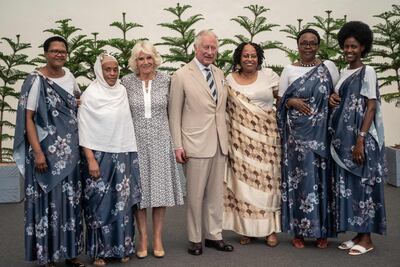Prince Charles lamented the atrocities committed during the Rwandan genocide as he was told about the murder of children during the violence.
He is in Rwanda for the much-awaited Commonwealth Heads of Government Meeting (Chogm) that was postponed by the pandemic.
He will represent Queen Elizabeth II, head of the Commonwealth, when prime ministers and presidents gather for the global summit.
The trip is the first by a UK royal to Rwanda – one of a minority of the world’s nations the queen has not visited.
The prince and his wife Camilla, the Duchess of Cambridge, toured the Kigali Genocide Memorial and were shown the personal testimonies of families who donated pictures of smiling children and listed touching personal details about their loved ones.
The royal couple signed a note of remembrance to accompany a wreath of white flowers.
The couple read intently the descriptions of the youngsters murdered during the 1994 genocide. Prince Charles reacted by saying: “Terrible, happens all too often”, while his wife expressed shock at “what humans can do to humans”.
Prince Charles and British Prime Minister Boris Johnson will attend a meeting later this week in Kigali of 54 Commonwealth countries, which could be awkward for the two of them.
A newspaper reported that the prince had privately described a UK government deal with Rwanda to deport illegal arrivals as appalling. The remarks potentially brought the monarchy into dispute with the government, but also could have offended Rwanda, which is hosting the Commonwealth Summit for the first time since it joined in 2009.
While the prince has repeatedly called for humanitarian treatment of refugees, the British prime minister has stuck by his government's deportation policy, despite a last-minute intervention by the European Court of Human Rights grounding the inaugural flight last week.
Ahead of Chogm the prince hailed the potential of the Commonwealth to make a difference on issues like climate change or providing opportunities for young people.
He said: “Taking shared responsibility to solve problems like these means the Commonwealth has the potential to make a profound difference in the lives of its citizens – and, in so doing, to be an unparalleled force for good in our world.”
During their first day of engagements, the duchess bonded with one survivor of the genocide during her visit when she was hugged by Uzamukunda Walida, who was gang raped but now openly discusses her experience.
In 1994, hundreds of thousands of members of the Tutsi community were slaughtered in Rwanda by ethnic Hutu extremists.

The remains of an estimated 250,000 victims are buried in the grounds of the memorial. In its education centre the couple laid a wreath with a handwritten card from Prince Charles which said: “In everlasting remembrance of those who died in the genocide against the Tutsi.”
As the couple toured the centre they were taken to a room where hundreds of pictures of victims were on display and spent several minutes looking at the faces of those killed by their countrymen and women.
The royal couple were joined by Freddy Mutanguha, executive director of the Aegis Trust, a UK-based organisation working to prevent genocide worldwide, which manages the memorial.
He survived the genocide and told the couple: “If I count my extended family I lost 80 members.” The duchess was taken aback, repeating the number 80.
Mr Mutanguha told them how he still hears the voices in his nightmares of the people who attacked his mother.
When Prince Charles and Camilla toured a series of rooms dedicated to the child victims they read the description of 12-year-old Francine, who was hacked to death with a machete, which listed her favourite things — from swimming to eating egg and chips.
Later the couple sat down for an informal chat with a small group of women survivors of the atrocities. The couple greeted the group warmly and the duchess was embraced by one of the women.

























